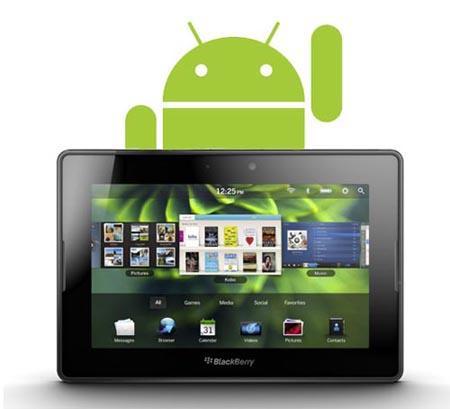
Research In Motion’s BlackBerry PlayBook, the company’s first tablet device, is set to launch on April 19th here in the United States. And while the tablet is feature rich, especially considering the power of the tablet itself, it’s still hindered by the fact that it’s being positioned by RIM as more of a corporate tool, rather than a device easily compared to the iPad, or Motorola’s XOOM tablet. But, RIM looks to be trying to fix that quandary by officially announcing that the PlayBook will be able to run Android-based applications within “a secure sandbox.” But, is the inclusion of Android-first applications just a gimmick to try and rake in a few more customers?
As it stands, the BlackBerry PlayBook is one of the most powerful and feature-heavy tablets coming down the pipe. Under the hood there’s a 1GHz dual-core processor; on the back you’ll find a 5MP camera, and on the front a 3MP front-facing camera. There’s 1GB of RAM, and the display is a 7-inch capacitive touchscreen with a resolution of 1024 x 600. It’s not the most powerful tablet, but it’s no slouch, either. And, while the mobile OS may look reminiscent of HP’s webOS, it’s unique in that it’s completely different than what we’ve seen on previous BlackBerry-branded devices.
Rumors about Android applications running on the BlackBerry PlayBook have been pretty constant for the last few months, but just yesterday RIM officially announced the full support for the applications. Owners of the PlayBook won’t have access to the Android Market or anything like that, but PlayBook developers will be able to port Android 2.3+ applications over to the PlayBook thanks to some simple tools. Users will then be able to download the ported applications thanks to RIM’s BlackBerry App World.
Is it a gimmick? Perhaps. There’s no doubt that a RIM manufactured product is meant primarily for the business world, but since the launch of BlackBerry OS 6, the company seems intent on striking some gold in the lucrative consumer market, too. With the launch of the PlayBook, which will initially probably not have many consumer applications ready to go, having the potential of running Android apps (and therefore a lot more consumer-based applications) is a great idea. Unfortunately for RIM, the ability for consumers to download these Android apps won’t be available until the summer, a few months after the launch of the tablet.
In my opinion, RIM needs something like this to differentiate itself from the market. More than that, they need to make sure that their tablet device is accessible by more than just the business market. If they want to make any kind of impressive sales numbers, the consumer market needs to be able to look at the PlayBook as a viable option, especially compared to Android-powered tablets, and the iOS-based iPad 2. And let’s not forget about HP’s tablet, the TouchPad.
What do you think of RIM’s decision to allow support for Android apps? Does this make you want to buy the PlayBook more? Or would you prefer to have an Android-powered tablet anyway? Let me know in the comments below.